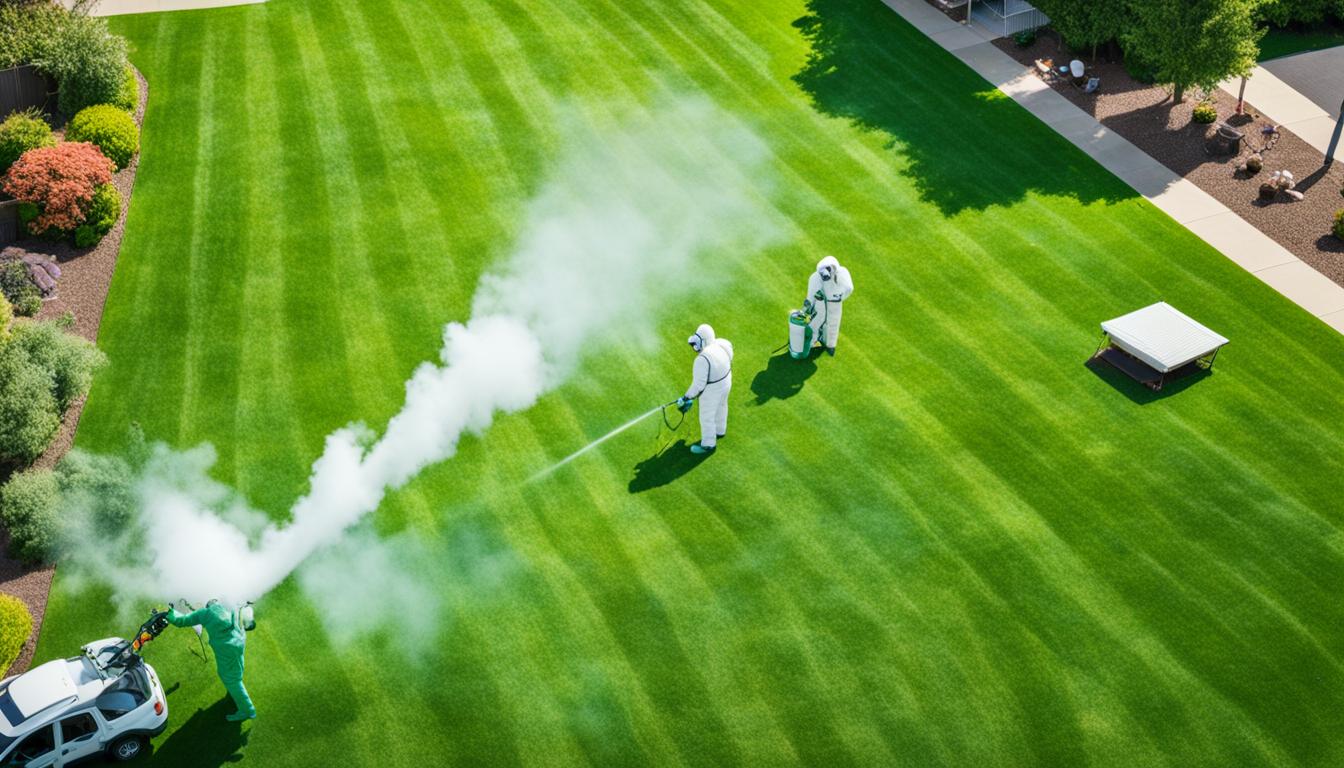Are you tired of pests wreaking havoc on your lawn? Do you want to maintain a beautiful, pest-free outdoor space? Look no further. This article will provide you with expert tips and organic solutions for effective lawn pest control. Discover the secrets to keeping your lawn safe from unwanted visitors and maintaining a lush, green paradise.
Key Takeaways:
- Regular lawn maintenance is crucial for preventing pest infestations.
- Natural pest control options, such as pest-repellent plants and natural repellents, can effectively deter pests.
- If natural remedies fail, professional lawn pest treatment services can provide customized solutions.
- Choosing the right lawn pest control products is essential for effective pest management.
- By taking proactive measures, such as preventing common yard pests and using DIY traps, you can reduce the risk of infestations.
Regular Lawn Maintenance to Prevent Pest Infestations
Regular lawn maintenance plays a vital role in preventing pest infestations. By following a few simple practices, you can create a less attractive environment for pests and reduce the risk of infestations.
Lawn pest prevention begins with proper grass maintenance. Regularly mowing your lawn at the recommended height helps discourage pests from taking up residence. When your grass is too long, it provides shelter and protection for pests. Keeping it at the proper height makes it less inviting for them.
Additionally, trimming bushes and shrubs around your lawn is crucial for minimizing potential habitats for pests. Overgrown foliage can provide hiding spots and breeding grounds for insects. By keeping these areas neat and tidy, you eliminate potential hotspots for pests to thrive.
A well-maintained lawn not only enhances the aesthetics of your outdoor space but also acts as a natural barrier against pests. By incorporating these practices into your regular lawn care routine, you can take a proactive approach to effective lawn pest management and lawn insect control.
Maintenance Tips for Pest Prevention
- Mow your lawn regularly at the recommended height.
- Trim bushes, shrubs, and trees to reduce hiding spots for pests.
- Keep foliage neat and tidy.
- Remove any standing water to prevent breeding grounds for mosquitoes.
- Inspect your lawn for signs of pests and take action if necessary.
By adhering to these maintenance tips, you can create an environment that is less attractive to pests, minimizing the risk of infestations.
| Lawn Maintenance Practices | Benefits |
|---|---|
| Regular mowing at the proper height | Discourages pests from taking up residence |
| Trimming bushes and shrubs | Reduces potential habitats for pests |
| Keeping foliage neat and tidy | Creates a less inviting environment for pests |
Natural Pest Control Options for Lawns
If you prefer to use natural methods for pest control, there are several options available. By incorporating organic lawn pest control solutions, you can protect your lawn from unwanted visitors while minimizing the use of harmful chemicals.
1. Plant Pest-Repellent Plants
One effective way to deter insects and pests from invading your lawn is by planting pest-repellent plants. These plants emit natural scents and oils that repel pests, creating a barrier of defense for your lawn.
Consider planting the following pest-repellent plants:
- Marigolds
- Lavender
- Mint
- Basil
- Rosemary
These plants not only add beauty to your garden but also serve as a natural deterrent against pests.
2. Use Natural Repellents
Another option for natural lawn pest control is using organic repellents. These natural substances are effective in repelling insects and pests without harming the environment.
Two common natural repellents for lawn pests are:
- Neem oil: Neem oil is derived from the seeds of the neem tree and acts as a natural insecticide. It disrupts the life cycle of pests, including aphids, mites, and whiteflies.
- Garlic spray: Garlic spray is made from garlic cloves blended with water. The strong odor deters pests and acts as a natural repellent against insects like mosquitoes and ants.
Applying these natural repellents to your lawn can help keep pests at bay without resorting to harsh chemicals.
| Pest Control Method | Description |
|---|---|
| Planting Pest-Repellent Plants | Planting pest-repellent plants like marigolds, lavender, mint, basil, and rosemary can help deter insects from your lawn. |
| Using Natural Repellents | Using natural repellents like neem oil or garlic spray can effectively keep pests at bay. |
3. Maintain a Healthy Lawn
Keeping your lawn healthy is an essential part of natural pest control. A well-maintained lawn is less susceptible to pest infestations.
To maintain a healthy lawn:
- Mow your grass at the proper height to discourage pests and promote healthy growth.
- Remove weeds regularly, as they can harbor pests and compete with your lawn for nutrients.
- Aerate your lawn to improve airflow and drainage, which can help prevent pest-friendly conditions.
- Water your lawn deeply and infrequently rather than shallowly and frequently to promote deep root growth and discourage pests.
By following these natural pest control methods and maintaining regular lawn care practices, you can create a beautiful and pest-free lawn.
Professional Lawn Pest Treatment Services
If your lawn is suffering from a pest infestation and natural remedies have proven ineffective, it’s time to consider professional lawn pest treatment services. Fortunately, there are numerous lawn pest control companies that specialize in eradicating pests and restoring the health of your lawn. These experts possess the knowledge and experience necessary to identify the specific pest species plaguing your lawn and implement effective control measures tailored to your unique needs.
By enlisting the services of a reputable lawn pest control company, you can trust that your lawn will receive the professional care it deserves. These experts utilize state-of-the-art equipment and proven techniques to safely eliminate pests while minimizing any potential harm to beneficial organisms and the environment. They are equipped to handle various common pests that wreak havoc on lawns, including but not limited to:
- Grubs
- Ants
- Mosquitoes
- Ticks
- Chinch bugs
Through comprehensive inspection and accurate pest identification, lawn pest control companies can develop a customized treatment plan to address your specific pest problems. This tailored approach ensures that the treatment methods used are not only effective in eliminating pests but also safe for your lawn and family.
One of the key advantages of hiring professionals for your lawn pest control needs is their access to advanced products and techniques that are not readily available to homeowners. These specialized products are formulated to specifically target and eradicate pests, offering long-lasting results and preventing future infestations.
Furthermore, professional lawn pest treatment services save you time and effort. Instead of spending hours researching DIY methods and trying various remedies to no avail, you can rely on the expertise of trained professionals who can promptly and effectively handle your pest problems. This allows you to focus on enjoying your outdoor space without the constant worry of pest damage.
When selecting a lawn pest control company, it’s crucial to choose a reputable and well-established provider. Research customer reviews and ask for recommendations from friends, family, or neighbors who have utilized lawn pest treatment services in the past. A trusted company will have a track record of success and will prioritize the health and well-being of your lawn while delivering exceptional results.
Don’t let pests take over your prized lawn. Invest in professional lawn pest treatment services to restore the beauty and vitality of your outdoor space.
Best Lawn Pest Control Products
When it comes to managing pests in your lawn, having the right products can make all the difference. There are a variety of lawn pest control products available on the market that can effectively eliminate pests and protect your lawn from damage. Whether you’re dealing with insects, rodents, or other pests, choosing the best products is essential for effective lawn pest management.
Insecticides
One of the most common types of lawn pest control products is insecticides. These products are formulated to target specific pests and can be applied directly to the affected areas. Insecticides come in various forms, including sprays, dusts, and granules. It’s important to carefully read and follow the instructions on the product label to ensure safe and effective use.
Lawn Sprays
Lawn sprays are another effective option for controlling pests in your lawn. These products are typically designed to cover a large area and can be applied using a sprayer or a hose-end attachment. Lawn sprays are available in both chemical and organic formulations, allowing you to choose the option that best suits your preferences and needs.
Granular Treatments
Granular treatments are convenient and easy-to-use products that can effectively control pests in your lawn. These small pellets or granules are spread evenly across the lawn using a spreader, delivering targeted pest control. Granular treatments are available for a wide range of pests and can provide long-lasting protection for your lawn.
Systemic Insecticides
Systemic insecticides are products that are absorbed by the plants themselves, making them an effective option for controlling pests that feed on plant sap or chew on leaves. These products are applied to the soil or sprayed onto the leaves, allowing the plants to take up the insecticide and distribute it throughout their tissues. Systemic insecticides provide continuous protection against pests, making them a popular choice among gardeners and lawn enthusiasts.
When choosing the best lawn pest control products, it’s important to consider the specific pests you’re dealing with and their life cycle. Different pests require different types of control methods, so it’s essential to select products that target the pests you’re trying to eliminate. Additionally, be mindful of the environmental impact of the products you choose and opt for eco-friendly options whenever possible.
Preventing Common Yard Pests
In addition to regular lawn maintenance and pest control measures, there are specific steps you can take to prevent common yard pests. Clearing out ant hills, addressing termite or carpenter ant infestations promptly, and maintaining proper garden growth can all help minimize the presence of pests in your yard. By being proactive and taking preventative measures, you can reduce the risk of a pest infestation and keep your lawn healthy.
Clearing Out Ant Hills
Ant hills in your yard can contribute to pest problems, as they often attract other insects. To prevent ant infestations, regularly inspect your lawn for ant hills and promptly remove them. Use a shovel or a garden tool to carefully excavate the ant hill and dispose of it away from your lawn. By eliminating ant hills, you can discourage ants from establishing colonies and reduce the likelihood of other pests being drawn to your yard.
Addressing Termite or Carpenter Ant Infestations
Termite and carpenter ant infestations can cause significant damage to your lawn and surrounding structures if left unchecked. If you suspect a termite or carpenter ant infestation, it’s crucial to take immediate action. Contact a professional pest control service to assess the situation and determine the best course of treatment. Timely intervention can help prevent further damage and protect your lawn and property.
Maintaining Proper Garden Growth
The way you maintain your garden can also impact the presence of pests in your yard. Overgrown vegetation and unkempt garden beds can provide hiding places and breeding grounds for many pests. Regularly trim bushes, remove weeds, and keep your garden tidy to minimize hiding spots for pests. Pruning trees and shrubs away from your house can also prevent pests from gaining easy access to your home.
By following these preventative measures, you can reduce the risk of common yard pests and protect your lawn from infestations. Remember to combine these efforts with regular lawn maintenance and pest control strategies for comprehensive and effective lawn pest management.
DIY Traps for Yard Pests
If you prefer a DIY approach to lawn pest control, there are effective traps you can create to catch yard pests without the use of chemicals. These homemade traps can help reduce pest populations in your lawn and be a natural alternative to professional pest control methods.
Beer Trap for Slugs and Snails
Slugs and snails are common pests that can wreak havoc on your lawn and garden. To create a beer trap, you’ll need a shallow dish or container and some beer. Bury the container in the ground so it is level with the surface. Fill it with beer, which will attract slugs and snails. They will crawl into the container and drown in the beer. Remember to empty and refill the trap regularly to maintain its effectiveness and prevent unpleasant smells.
Sticky Traps for Flying Insects
Flying insects like flies and mosquitoes can be a nuisance in your yard. Creating sticky traps can help capture these pests and reduce their numbers. You can purchase sticky traps from gardening stores or make your own by applying a sticky substance, such as petroleum jelly, to a piece of cardboard or paper. Hang the traps in areas where flying insects are most active, such as near light sources or vegetation. The insects will become stuck to the traps, preventing them from buzzing around and bothering you.
While DIY traps can be effective in controlling smaller pest populations, it’s important to note that they may not be as effective as professional pest control methods for larger infestations. If you have a severe pest problem, it’s recommended to consult with a lawn pest control professional for comprehensive and targeted solutions.
To further enhance the effectiveness of your DIY traps, consider implementing other lawn pest prevention measures discussed in this article. By combining these strategies, you can create a more robust and successful lawn pest management plan.
Safely Disposing of Pest-Infested Plant Material
When it comes to lawn pest control and effective lawn pest management, proper disposal of pest-infested plant material is crucial in preventing the spread of pests. Improper disposal methods can attract more pests and potentially lead to further infestations. To keep your lawn protected, it’s important to follow these guidelines for disposing of pest-infested plant material.
Avoid Composting or Leaving the Material in Piles
Composting or leaving pest-infested plant material in piles can create an ideal breeding ground for pests. The decaying organic matter provides a continuous food source for insects and other pests, allowing them to thrive and reproduce. Avoid temptation and resist the urge to compost or leave the material in piles, as this can increase the risk of pest infestations in your lawn.
Bag the Infested Material Securely
Instead of composting or piling up the pest-infested plant material, bag it securely to prevent any potential escape of pests. Use a sturdy plastic bag that is tightly sealed to prevent pests from spreading. This ensures that pests are trapped and cannot find their way back into your lawn or surrounding areas.
Dispose of the Bagged Material in the Trash
The most effective way to dispose of pest-infested plant material is to place the securely bagged material in the trash. By doing so, you remove the possibility of pests escaping and reinfesting your lawn. Be sure to tie the bag tightly and dispose of it in a designated trash bin to ensure proper containment and eliminate any risk of pests spreading.
Burning as an Alternative Method
In some cases, burning the pest-infested plant material may be an option for safe disposal. However, it’s important to check with local regulations and guidelines regarding open burning. If burning is permitted in your area, take the necessary precautions and follow safety procedures to avoid any accidental fires and ensure proper extinguishing of the burned material.
Proper Disposal for a Pest-Free Lawn
Properly disposing of pest-infested plant material is an essential step in maintaining a pest-free lawn. By avoiding composting or piling up the material, securely bagging it, and disposing of it in the trash, you can effectively prevent the spread of pests and protect your lawn from further infestations. Remember to follow local regulations and guidelines for safe disposal options, including the option of burning if applicable.
| Pest-Infested Plant Material Disposal Methods | Effective | Ineffective |
|---|---|---|
| Composting | No | Yes |
| Leaving in Piles | No | Yes |
| Secure Bagging | Yes | No |
| Disposing in the Trash | Yes | No |
| Burning | Varies by location | Varies by location |
Conclusion
Protecting your lawn from pests is crucial for maintaining a beautiful and healthy outdoor space. With a proactive approach to lawn pest control, you can create a pest-free environment that allows your lush greens to thrive.
Implementing regular maintenance practices, such as proper mowing and trimming, is essential for preventing pest infestations. By keeping your lawn well-maintained, you create a less attractive environment for pests, reducing the risk of infestations.
In addition to regular maintenance, using natural pest control methods can be highly effective in keeping pests at bay. Planting pest-repellent plants and using natural repellents like neem oil provide safe and eco-friendly alternatives to chemical pesticides.
If natural methods are not sufficient, seeking professional lawn pest treatment services can help address severe infestations. Skilled professionals can provide customized solutions tailored to your lawn’s specific needs, ensuring effective and long-lasting pest control.
By taking preventative measures, choosing the best lawn pest control products, and following proper disposal methods, you can create a pest-free and healthy lawn that you can enjoy all season long.





